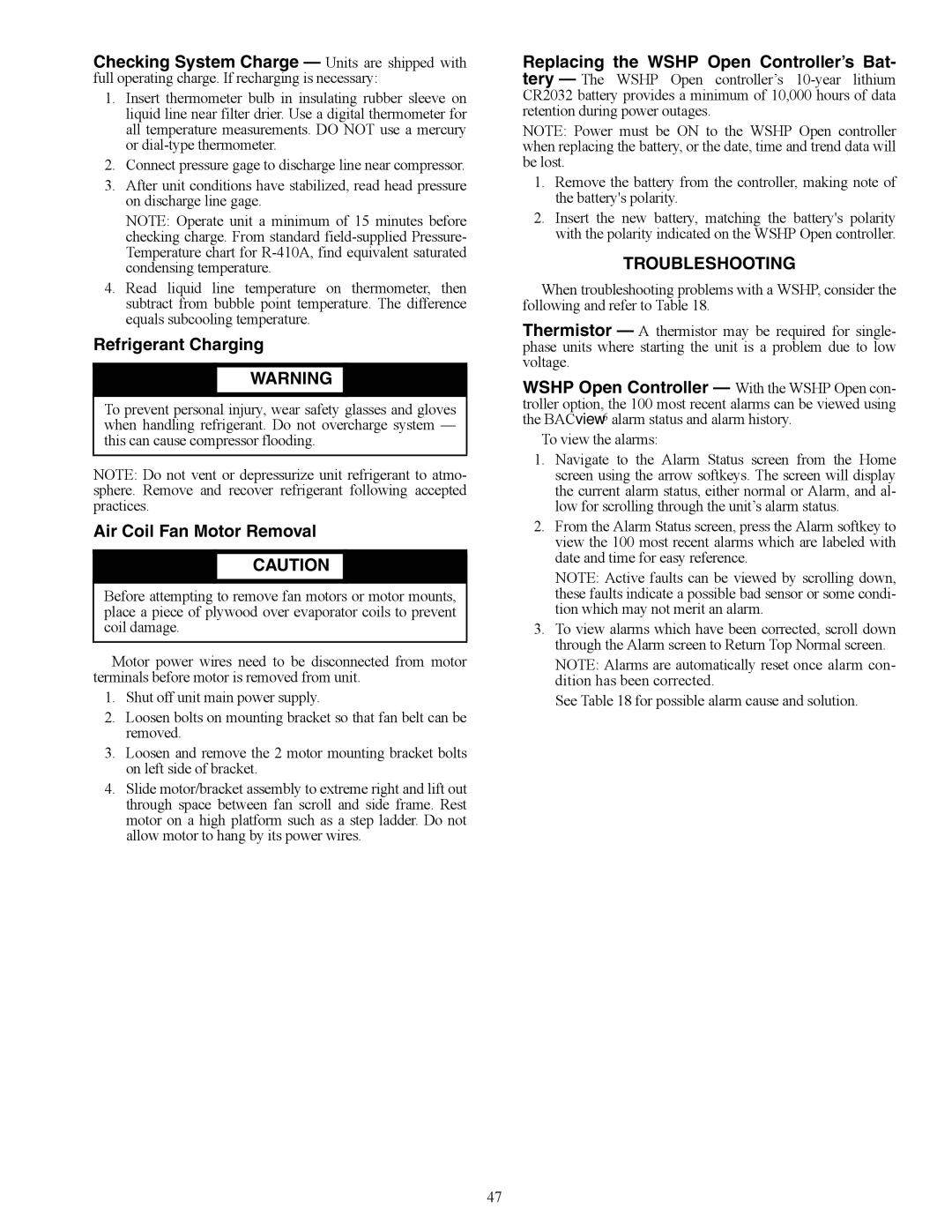
Checking System Charge — Units are shipped with full operating charge. If recharging is necessary:
1.Insert thermometer bulb in insulating rubber sleeve on liquid line near filter drier. Use a digital thermometer for all temperature measurements. DO NOT use a mercury or
2.Connect pressure gage to discharge line near compressor.
3.After unit conditions have stabilized, read head pressure on discharge line gage.
NOTE: Operate unit a minimum of 15 minutes before checking charge. From standard
4.Read liquid line temperature on thermometer, then subtract from bubble point temperature. The difference equals subcooling temperature.
Refrigerant Charging
![]() WARNING
WARNING
To prevent personal injury, wear safety glasses and gloves when handling refrigerant. Do not overcharge system — this can cause compressor flooding.
NOTE: Do not vent or depressurize unit refrigerant to atmo- sphere. Remove and recover refrigerant following accepted practices.
Air Coil Fan Motor Removal
![]() CAUTION
CAUTION
Before attempting to remove fan motors or motor mounts, place a piece of plywood over evaporator coils to prevent coil damage.
Motor power wires need to be disconnected from motor terminals before motor is removed from unit.
1.Shut off unit main power supply.
2.Loosen bolts on mounting bracket so that fan belt can be removed.
3.Loosen and remove the 2 motor mounting bracket bolts on left side of bracket.
4.Slide motor/bracket assembly to extreme right and lift out through space between fan scroll and side frame. Rest motor on a high platform such as a step ladder. Do not allow motor to hang by its power wires.
Replacing the WSHP Open Controller’s Bat-
tery — The WSHP Open controller’s
NOTE: Power must be ON to the WSHP Open controller when replacing the battery, or the date, time and trend data will be lost.
1.Remove the battery from the controller, making note of the battery's polarity.
2.Insert the new battery, matching the battery's polarity with the polarity indicated on the WSHP Open controller.
TROUBLESHOOTING
When troubleshooting problems with a WSHP, consider the following and refer to Table 18.
Thermistor — A thermistor may be required for single- phase units where starting the unit is a problem due to low voltage.
WSHP Open Controller — With the WSHP Open con- troller option, the 100 most recent alarms can be viewed using the BACview6 alarm status and alarm history.
To view the alarms:
1.Navigate to the Alarm Status screen from the Home screen using the arrow softkeys. The screen will display the current alarm status, either normal or Alarm, and al- low for scrolling through the unit’s alarm status.
2.From the Alarm Status screen, press the Alarm softkey to view the 100 most recent alarms which are labeled with date and time for easy reference.
NOTE: Active faults can be viewed by scrolling down, these faults indicate a possible bad sensor or some condi- tion which may not merit an alarm.
3.To view alarms which have been corrected, scroll down through the Alarm screen to Return Top Normal screen.
NOTE: Alarms are automatically reset once alarm con- dition has been corrected.
See Table 18 for possible alarm cause and solution.
47
